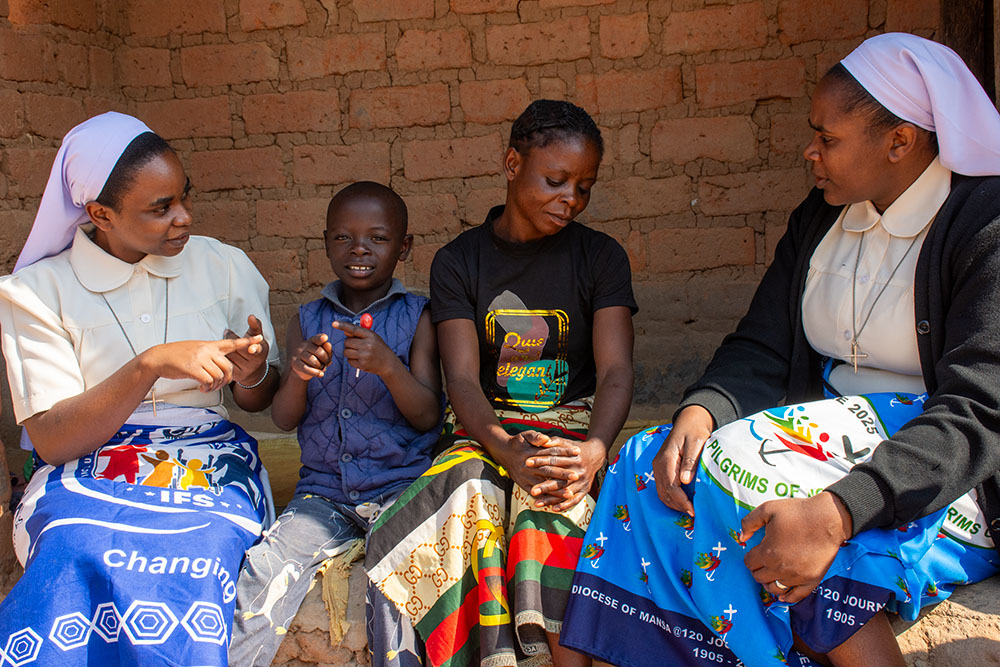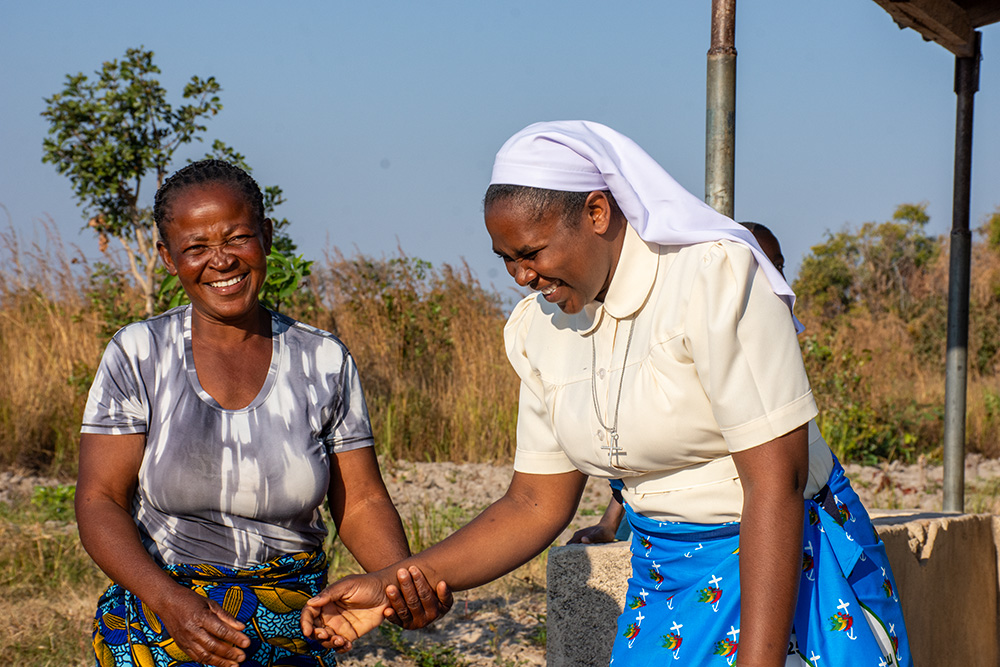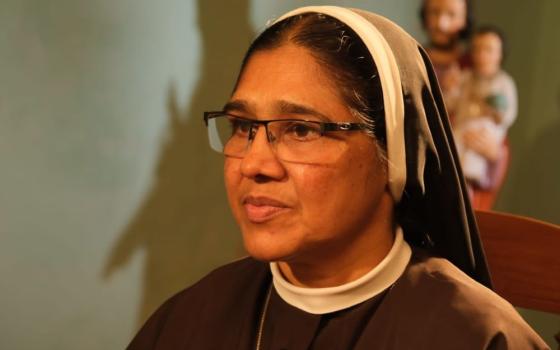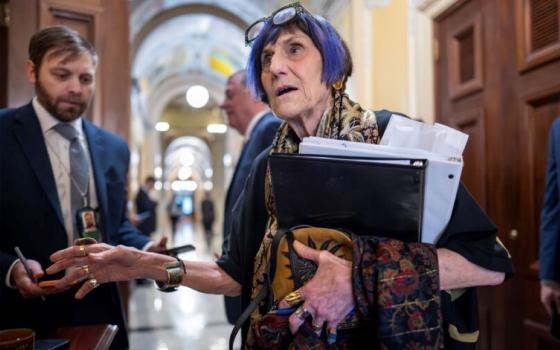
Sr. Ruth Kuyumba, right, engages Memory Musonda and her son Joshua in a conversation during a home visit. Sr. Agnes Kateule, left, uses sign language to communicate with Joshua. Memory and Joshua were beneficiaries of the recently defunded Inclusive Family Strengthening project, formerly managed by the Sisters of Mercy with support from Catholic Relief Services. (Derrick Silimina)
In the town of Mansa, a cool breeze from Lake Bangweulu moves through picturesque landmarks like the Mumbuluma waterfalls. Despite the scenic beauty of the Luapula province, many women face significant challenges related to social exclusion.
Memory Musonda, 31, recalls the emotional impact of her son's health crisis when he suddenly experienced language regression, often associated with autism. Musonda shared with Global Sisters Report how cultural perceptions of certain illnesses and disabilities influenced her family's stability and social relationships.
"My husband believed that our child's condition was a result of witchcraft, which led to his departure from home," she said.
Musonda, 31, said her traumatic abandonment is an example of the gender inequality and discrimination faced by vulnerable women in the southern African country, compounded by high poverty, entrenched cultural norms, illiteracy, insufficient social support systems and limited access to health care.
She said that in Mansa town, about 760 km north of Lusaka, Zambia's capital, there is a prevalent cultural belief linking certain illnesses to witchcraft. These beliefs often result in stigma, social exclusion and family separation.
"I was heartbroken seeing my son's loss of speech at the age of 1 year and 3 months after suffering chronic malaria, particularly because it reversed a developmental milestone I had proudly celebrated," she said.
Despite efforts toward gender equality, women in Zambia continue to face significant challenges in accessing opportunities and achieving social inclusion, reflecting ongoing societal disparities across southern Africa.
Catherine Chama, a 54-year-old resident of Makasa village in Mansa District, is also experiencing significant hardships in supporting her extended family following her husband's abandonment.
Advertisement
"As a single mother, I often face difficulties, and my survival over the years has largely depended on the support of well-wishers, particularly from religious sisters of the Diocese of Mansa," Chama told GSR.
Chama's situation has worsened, as she is now also responsible for caring for her 15-year-old grandson, who has epilepsy.
Despite challenges, Chama and Musonda found hope and support in the recently defunded Inclusive Family Strengthening (IFS) project, formerly managed by the Sisters of Mercy with support from the U.S. bishops' humanitarian agency, Catholic Relief Services (CRS).
"The IFS project helped me come to terms with my situation and overcome societal stigma related to my disabled child, who is now 7 years old," Musonda said. She added that the sisters' efforts played a crucial role in family reintegration, as evidenced by her husband's return home.
The project, which commenced in 2021 and concluded in 2024 due to donor limitations, served almost 1,000 women and 3,000 indirect beneficiaries, according to project records. This included families with children living in extreme poverty, child-headed households, grandparent-headed households, households with children in violent environments, and children living with disabilities. Indirect beneficiaries included caregivers, community leaders and other stakeholders, emphasizing a community-wide approach to family strengthening and social inclusion.
The project encompassed a wide range of interventions aimed at supporting children and strengthening families, including taking children to rehabilitation, providing mental health support, conducting household visits, community sensitization, stakeholder engagement, social cohesion training, and radio programs focused on changing social behavior.
Chama echoed Musonda's praise, saying, "The IFS was a game changer as the project enabled my access to essential services with ease, and my family never lacked support."

Mercy Sr. Ruth Kayumba shares a light moment with Catherine Chama, a beneficiary of the recently defunded Inclusive Family Strengthening project. (Derrick Silimina)
However, Chama voiced concern about the project ending, particularly regarding its ability to continue supporting her grandson, who was about to be enrolled in a special school by the sisters. Many vulnerable families are on waiting lists and without the necessary financial means to sustain their loved ones.
According to a 2025 CRS performance evaluation report, the Inclusive Family Strengthening project successfully enhanced caregiver resilience, social support and access to essential services. It highlighted an increase in positive parenting behaviors, including showing affection and rewarding good behavior, and noted better stress management among caregivers.
Chama said the project was known for creating a more supportive community environment, promoting the inclusion of children with disabilities in community activities, and emphasizing the importance of recognizing and advocating for disability rights.
Sr. Ruth Kuyumba, the project's former coordinator, spoke to GSR about its many achievements.
"We recorded over 200 success stories, as the project covered a lot of people, especially in rural areas where the initiative also promoted fathers' participation in parenting and ensured every child has a home to grow up in," she said.
Kuyumba, a member of the Sisters of Mercy under the Mansa Diocese, shared how the project's efforts stood out due to positive feedback, behavioral changes, disability inclusion, rehabilitation successes, nutritional support, and access to education and health facilities for children.
"As Sisters of Mercy, we are called to witness God's sympathy to his people, and we were privileged to deepen our charism of compassion through the IFS project. Our support, care and love made an impact on the lives of vulnerable families in Luapula Province, particularly Mansa, Lubwe and Kasaba," she said.
She emphasized that the smooth implementation of the project depended on the dedicated efforts of six sisters from her congregation, who actively collaborated with caregivers and with community, government and church leaders.
Kuyumba said that local, church and community leaders were enthusiastic about the project and fully involved in fighting stigma and reporting abuse, while stakeholders and caregivers were empowered with knowledge through capacity building.
"We are proud that the project made significant positive impacts. Previously, beneficiaries and their families faced societal discrimination, with women struggling to access education for their children and children with disabilities hidden at home due to fear of stigma. We hope to attract more funders to continue and scale the project, ensuring lasting positive change in the community."






